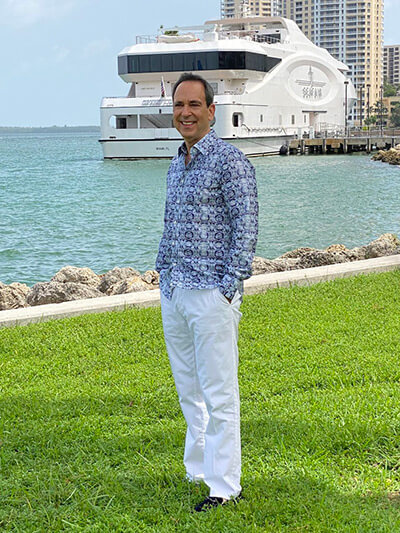An Overview of Cruise Ship Safety Laws for Passengers and Employees
All of the cruise ship companies register in foreign countries, and register their ships in foreign countries. The flags of these vessels are referred to as flags of convenience because the cruise ship companies register these vessels in foreign countries in order to enjoy favorable laws, including avoiding United States taxes.
What are the many favorable laws that the cruise ship companies enjoy? Cruise ship accident lawyer Brett Rivkind discusses these laws and why they may need to change to ensure better passenger safety.
Cruise Ship Laws for Passengers
First, let’s focus on claims involving passengers onboard cruise ships.
The first thing a passenger must be concerned with is the passenger ticket issued by the cruise line. It is referred to as a contract of passage. However, it is not really a contract, although it is considered legally to be one. It is merely a number of provisions which disclaim and limit the liability of the cruise ship company. It grants no rights to the passengers. It takes rights away.
In the passenger ticket, the cruise ship company sets forth the deadline to file a lawsuit against them arising out of personal injury or death. The deadline is one year from the date of the incident. This is an extremely short statute of limitations for cruise ship accident lawsuits. Most statute of limitations involving personal injury and maritime wrongful death claims are 2 to 4 years. The cruise ship company enjoys the benefit of being able to limit the time a passenger can file a lawsuit against them to a very short one year period of time. In addition, the cruise ship company requires written notice to be provided of such a claim within 6 months.
Not only is the cruise ship company able to limit the time to file the lawsuit to one year, the cruise ship company is able to state where the lawsuit must be filed. Typically, the cruise ship company has chosen to require the lawsuit to be filed in the city where the cruise ship maintains its base of operations. Over the years the cruise ship companies have realized it benefits them to require passengers to file in the federal district court. This makes it more difficult for the passenger to pursue a claim, and can also result in depriving a passenger of his or her right to a jury trial. Accordingly, the major cruise ship companies are now requiring the lawsuit to be filed in a federal district court.
Once aboard the ship, passengers will engage in many of the shipboard activities offered to them. The mega cruise ships now offer rock climbing, zip line activities, ice skating, and the popular Flowrider activity. The cruise ship companies will issue disclaimers of any liability for these accidents. Recently, a federal appellate court struck down the cruise line’s attempt to limit their liability for negligence arising out of the operation of shipboard activities. This was one favorable ruling for a passenger. If you were injured performing any of these activities, our attorneys for cruise ship rock climbing injuries and cruise ship surfing simulator injury lawyers can help you.
If a passenger gets sick, or needs to see the ship’s medical doctor for some reason, the passenger will soon be surprised to find out that the cruise ship company will assert that the ship’s medical staff are independent contractors for which the cruise line disclaims any liability for their negligence. Although cruise lines promote the availability of medical care aboard their cruise ships, and although the ship’s medical staff appears to be members of the ship’s crew, the cruise ship companies assert that they are independent contractors when they treat passengers and therefore the cruise lines have no liability for their negligence. The courts have ruled that the ship’s medical doctors are independent contractors.
Passengers may also embark on shoreside excursions during a cruise. Again, the cruise ship company will set forth in the passenger ticket that any shoreside excursions are operated by independent contractors for which the cruise line disclaims any liability for their negligence if a passenger is injured in a cruise ship shore excursion. Again, the courts have upheld this argument, and found that the shoreside excursion operators are in fact independent contractors.
Cruise Ship Wrongful Death Under the Death on the High Seas Act
The cruise ship companies also take advantage of a very favorable statute called the Death on the High Seas Act. This archaic and unfair statute, limits recovery in a case of a wrongful death case. It limits recovery to pecuniary loss only. This often results in a harsh restriction on the amount of recovery family members can make for the loss of their loved one aboard a cruise ship. For example, if a minor child dies onboard a cruise ship, and the family members bring a wrongful death action that is governed by the Death on the High Seas Act, recovery could be limited to funeral expenses. This harsh federal statute is still on the books despite attempts to have it amended after the BP oil spill disaster. After the BP oil spill disaster, amendments were pushed forward in Congress to amend the Death on the High Seas Act because of the harsh restriction on the amount of damages the family members of those killed in the BP oil spill disaster were going to be able to recover under the Death on the High Seas Act. Although it looked like there were positive movements toward amendment of the Death on the High Seas Act, strong opposition from the lobbyist of the shipping industry, including the cruise ship industry, defeated these attempts. The Death on the High Seas Act remains the law at this time.
International and Foreign Cruise Ship Laws
All of these favorable laws also combine with the fact that the cruise ship companies are registered in foreign countries and fly foreign flags of convenience. This enables them to avoid many laws in the United States. It also raises complex jurisdictional issues when an incident does happen on the high seas, including a crime. The well known case involving the disappearance of George Smith during his honeymoon cruise raised a lot of issues involving the Death on the High Seas Act, the Athens Convention, as well complex jurisdictional issues as to who had jurisdiction to investigate the potential murder. Our firm represented the parents of George Smith in that case.
The Athens Convention applies when a cruise ship operates a cruise where none of the ports involve a United States port. Therefore, a United States citizen on a cruise ship operated by a United States-based cruise ship company may still face a significant restriction on the number of damages recoverable if the Athens Conventions applies.
Cruise Ship Laws for Crewmembers, Seamen, and Employees
Crewmembers also have been hindered in their attempts to recover fair and just compensation for injuries and death aboard cruise ships. The cruise ship company hires crewmembers from third world countries. The employment agreements are “take it or leave it” employment agreements. The seamen have no bargaining power at all. Most of the seamen do not understand the employment agreements. Very few are given the time to read the entire employment agreement. Many sign the employment agreement literally as they are getting on the ship after traveling a long distance from their country. There is no turning back at that point in time.
The employment agreements with the seamen are now containing mandatory arbitration provisions, including the application of foreign law. This is another attempt on the part of the cruise ship industry to avoid their legal liabilities under United States law, and unfairly limit the compensation to the workers.
The cruise ship industry with the employment of foreign labor at minimum cost results in many unskilled individuals working aboard cruise ships. It also results in overworking the crewmembers. All of this affects safety. When a major event does happen, including serious personal injury or wrongful death, the cruise ship companies then enjoy the benefits of these favorable maritime laws. In order for there to be positive changes and accountability on the part of corporations, we must hold them accountable for full and complete compensation when their actions cause injury or death. These favorable laws allow the cruise ship industry to escape full accountability for negligence and wrongful conduct.
How Does the Limitation of Liability Act Affect Fault in a Cruise Ship Accident Claim?
Another archaic maritime law is called the Limitation of Liability Act. After a disaster such as the Costa Concordia, a shipowner can file a limitation of liability action in a federal district court in the United States, asking the court to limit their liability to the value of the vessel after the disaster. Therefore, if a vessel is a total loss after a major disaster, a shipping company can come into a federal district court and ask that their liability be limited to a negligible amount compared to the loss of that was caused.
Cruise Ship + Maritime Accident Lawyers Offering Free Consultations
This is just a brief overview of many of the favorable laws the cruise ship companies enjoy. They are very complex, and each case needs to be analyzed on a case by case basis. Hopefully, out of this tragedy involving the Costa Concordia, some good will happen. Hopefully, there will be an increased focus again on the cruise ship industry, and we will see positive changes in the laws which will allow both passengers and crewmembers to enjoy greater rights when injured or killed aboard a cruise ship. Increased accountability on the part of the cruise ship company will result in increased safety awareness on the part of the cruise ship industry and increased implementation of safety procedures and policies.
Our cruise ship water park injury law firm continues to act as safety advocates for those injured or harmed at sea. For a free consultation about your rights as a passenger or employee of a cruise ship, contact us today at (305) 374-0565.


